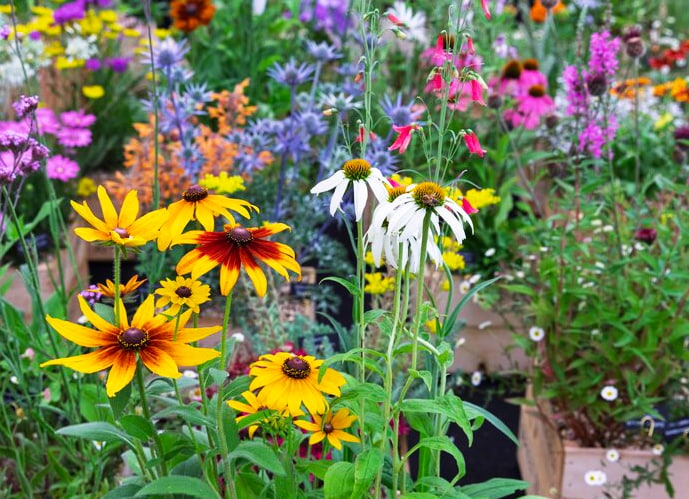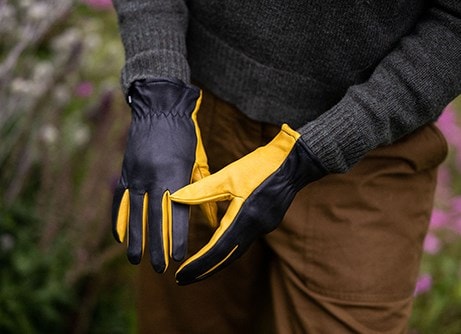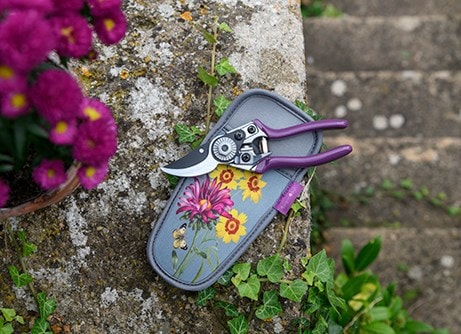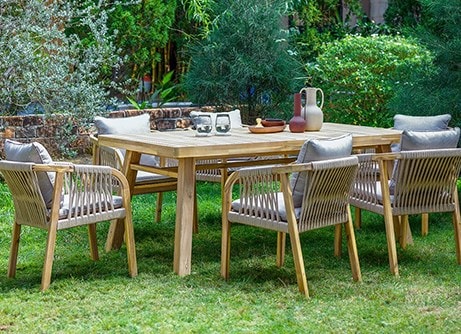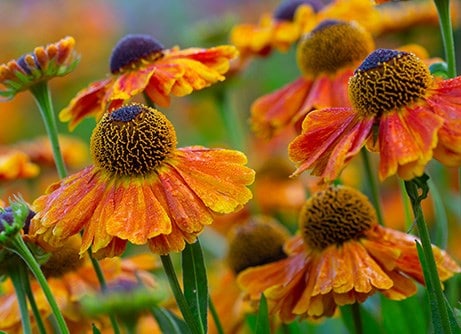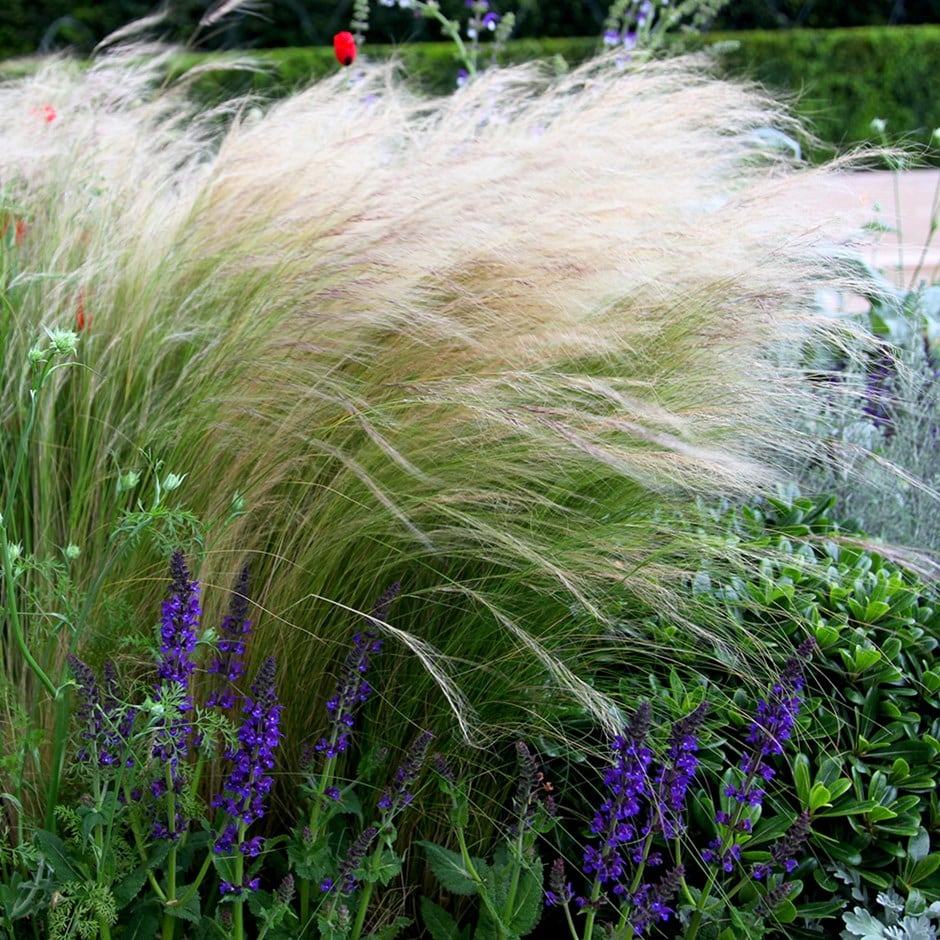
A wonderfully versatile ornamental grass, Stipa tenuissima is known for its wispy, pale yellow-green leaves. These are topped with feathery, silver-green plumes that mature into a blonde-buff hue. Ideal for adding movement, the soft, flowing foliage sways gracefully in the lightest breeze, earning its common name 'ponytail grass.'
This semi-evergreen grass typically grows to a height of 60cm (24in) and spreads around 30-45cm (12-18in). Its compact size makes it perfect for sunny gravel gardens, large containers, or mixed perennial borders.
Stipa tenuissima plants thrive in well-drained soil and full sun. Once established, it tolerates drought, making it ideal for dry (xeriscaping) or low-maintenance gardens.
This semi-evergreen grass works beautifully in new perennial borders. Its fine, feathery texture complements bold perennials such as Verbena bonariensis or Echinacea. In containers, it pairs well with other drought-tolerant plants like Lavandula angustifolia 'Hidcote' and Nepeta, adding softness and movement.
It's easy growing, and easy going, nature extends to pruning - there is no need to cut back Stipa tenuissima.
For a minimalist look, consider Libertia chilensis, while bold displays might include Allium sphaerocephalon, Aquilegia, Helenium and Sedum (Hylotelephium).
This semi-evergreen grass typically grows to a height of 60cm (24in) and spreads around 30-45cm (12-18in). Its compact size makes it perfect for sunny gravel gardens, large containers, or mixed perennial borders.
Stipa tenuissima plants thrive in well-drained soil and full sun. Once established, it tolerates drought, making it ideal for dry (xeriscaping) or low-maintenance gardens.
Growing conditions and versatility
Stipa tenuissima prefers full sun and well-drained soil. It thrives in gravel gardens and coastal regions. While drought-tolerant once established, watering during dry spells helps it flourish.This semi-evergreen grass works beautifully in new perennial borders. Its fine, feathery texture complements bold perennials such as Verbena bonariensis or Echinacea. In containers, it pairs well with other drought-tolerant plants like Lavandula angustifolia 'Hidcote' and Nepeta, adding softness and movement.
It's easy growing, and easy going, nature extends to pruning - there is no need to cut back Stipa tenuissima.
Wildlife benefits
This ornamental grass provides shelter for small wildlife and insects, especially in naturalistic gardens. Its open structure helps pollinators access nearby flowers, making it a valuable addition to wildlife-friendly spaces.Companion Planting
Pair Stipa tenuissima with other sun-loving, drought-tolerant plants Nepeta ‘Walker’s Low' and Achillea millefolium. In a modern or Mediterranean garden, it can be combined with Agapanthus and Eryngium for contrasting form and texture.For a minimalist look, consider Libertia chilensis, while bold displays might include Allium sphaerocephalon, Aquilegia, Helenium and Sedum (Hylotelephium).
How to care for Stipa tenuissima:
Plant in spring or autumn, choosing a sunny location with well-drained soil. Dig a hole twice the size of the root ball and place the plant at the same depth it was growing in its nursery pot, working in plenty of well-rotted compost into the planting area and backfill. Space multiple plants about 30cm (12in) apart to allow for air circulation and growth.
Water well after planting and continue to water regularly until the plant is established (once established Stipa tenuissima becomes more drought-tolerant).
Wearing gloves, comb through the plant in early spring to remove dead foliage.
This grass is relatively pest and disease-free but can be sensitive to prolonged wet conditions, so ensure good drainage. While it tolerates poor soil, applying a general fertiliser during the growing season encourages healthy growth.
Water well after planting and continue to water regularly until the plant is established (once established Stipa tenuissima becomes more drought-tolerant).
Wearing gloves, comb through the plant in early spring to remove dead foliage.
This grass is relatively pest and disease-free but can be sensitive to prolonged wet conditions, so ensure good drainage. While it tolerates poor soil, applying a general fertiliser during the growing season encourages healthy growth.
Sowing instructions:
Sow seeds indoors from January to March in trays filled with seed compost. Scatter seeds thinly across the surface, lightly covering them with a fine layer of compost. Gently press down to firm the soil and keep consistently moist but not wet.
Cover the trays with glass, polythene, or a propagator lid to maintain humidity. Germination typically occurs within two to four weeks, but it may occasionally take longer. Once germinated, place the trays in cooler conditions.
Transplant approximately four to six weeks after germination when the seedlings are large enough to handle. Carefully separate a small clump and transfer them to individual pots filled with well-drained, peat-free compost. Harden off the seedlings before planting them outdoors once all risk of frost has passed.
Cover the trays with glass, polythene, or a propagator lid to maintain humidity. Germination typically occurs within two to four weeks, but it may occasionally take longer. Once germinated, place the trays in cooler conditions.
Transplant approximately four to six weeks after germination when the seedlings are large enough to handle. Carefully separate a small clump and transfer them to individual pots filled with well-drained, peat-free compost. Harden off the seedlings before planting them outdoors once all risk of frost has passed.
Flowering period:
- Jan
- Feb
- Mar
- Apr
- May
- Jun
- Jul
- Aug
- Sep
- Oct
- Nov
- Dec
Eventual height:
0.6m
Eventual spread:
0.3m
Position:
Full sun
Rate of growth:
Average
Soil:
Moderately fertile, moist, well-drained soil
Hardiness:
Fully hardy
-
This grass is semi-evergreen, so it can lose some of its foliage in winter. In colder regions or more exposed gardens, it may lose it all, but then fresh new growth appears again in spring.
Product options

2 litre pot
£18.99
available to order from autumn
Unavailable

9cm pot
was £8.99
now £7.19
In stock
(shipped within 2-3 working days)
(shipped within 2-3 working days)

3 × 9cm pots
was £19.99
now £15.99
£5.33 each
In stock
(shipped within 2-3 working days)
(shipped within 2-3 working days)

6 × 9cm pots
was £35.99
now £28.79
£4.80 each
In stock
(shipped within 2-3 working days)
(shipped within 2-3 working days)

3 × 2 litre pots
£44.99
£15.00 each
available to order from autumn
Unavailable

approx 30 seeds
£3.79
available to order from autumn
Unavailable
1
Delivery options (pick your preferred option at checkout)
Standard Delivery£5.99
Goes well with
Helenium 'Moerheim Beauty'
sneezeweed
From £7.69
View options
| 9cm pot | £7.69 |
|
|
| 3 × 9cm pots | £11.86 |
|
|
| 2 litre pot | £17.99 |
|
|
| 3 × 2 litre pots | £42.99 |
|
View details
Nepeta racemosa 'Walker's Low'
catnip
From £8.99
View options
| 2 litre pot | £15.19 |
|
| 3 × 2 litre pots | £35.99 |
|
| 9cm pot | £8.99 |
|
| 3 × 9cm pots | £20.99 |
|
| 6 × 9cm pots | £35.99 |
|
View details
Salvia nemorosa 'Caradonna'
Balkan clary
From £7.99
View options
| 9cm pot | £7.99 |
|
|
| 6 × 9cm pots | £26.39 |
|
|
| 3 × 9cm pots | £19.19 |
|
|
| 2 litre pot | £17.99 |
|
|
| 3 × 2 litre pots | £44.99 |
|
View details
Achillea 'Walther Funcke'
yarrow
From £6.99
View options
| 9cm pot | £6.99 |
|
|
| 3 × 9cm pots | £16.09 |
|
|
| 6 × 9cm pots | £27.99 |
|
|
| 2 litre pot | £19.99 |
|
|
| 3 × 2 litre pots | £49.99 |
|
View details
Rudbeckia fulgida var. sullivantii 'Goldsturm'
coneflower
From £6.99
View options
| 2 litre pot | £14.39 |
|
| 3 × 2 litre pots | £35.99 |
|
| 9cm pot | £6.99 |
|
| 3 × 9cm pots | £16.09 |
|
| 6 × 9cm pots | £24.49 |
|
View details
Verbena bonariensis
purple top
From £2.49
View options
| 2 litre pot | £17.99 |
|
| 3 × 2 litre pots | £44.99 |
|
| 9cm pot | £4.79 |
|
| 3 × 9cm pots | £10.79 |
|
| 6 × 9cm pots | £17.39 |
|
| 3 × packets (approx 750 seeds) | £6.00 |
|
| approx 250 seeds | £2.49 |
|
View details
Geum 'Totally Tangerine' (PBR)
avens
From £14.99
View options
| 2 litre pot | £19.99 |
|
| 3 × 2 litre pots | £47.99 |
|
| 9cm pot | £14.99 |
|
| 3 × 9cm pots | £34.99 |
|
| 6 × 9cm pots | £49.99 |
|
View details
Penstemon 'Raven' (Bird Series)
beard tongue
From £8.99
View options
| 9cm pot | £8.99 |
|
|
| 3 × 9cm pots | £19.99 |
|
|
| 2 litre pot | £19.99 |
|
|
| 3 × 2 litre pots | £49.99 |
|
View details

